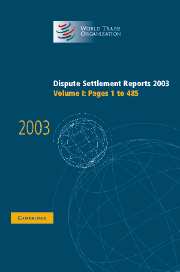Book contents
- Frontmatter
- Contents
- United States – Countervailing Measures Concerning Certain Products from the European Communities (WT/DS212): Report of the Appellate Body
- United States – Countervailing Measures Concerning Certain Products from the European Communities (WT/DS212): Report of the Panel
- Canada – Measures Affecting the Importation of Milkand the Exportation of Dairy Products – Second Recourse to Article 21.5 of the DSU by New Zealand and the United States (WT/DS103, WT/DS113): Report of the Appellate Body
- Canada – Measures Affecting the Importation of Milkand the Exportation of Dairy Products – Second Recourse to Article 21.5 of the DSU by New Zealand and the United States (WT/DS103, WT/DS113): Report of the Panel
- United States – Continued Dumping and Subsidy Offset Act of 2000 (WT/DS217, WT/DS234): Report of the Appellate Body
- Cumulative Index of Published Disputes
United States – Countervailing Measures Concerning Certain Products from the European Communities (WT/DS212): Report of the Appellate Body
Published online by Cambridge University Press: 13 December 2017
- Frontmatter
- Contents
- United States – Countervailing Measures Concerning Certain Products from the European Communities (WT/DS212): Report of the Appellate Body
- United States – Countervailing Measures Concerning Certain Products from the European Communities (WT/DS212): Report of the Panel
- Canada – Measures Affecting the Importation of Milkand the Exportation of Dairy Products – Second Recourse to Article 21.5 of the DSU by New Zealand and the United States (WT/DS103, WT/DS113): Report of the Appellate Body
- Canada – Measures Affecting the Importation of Milkand the Exportation of Dairy Products – Second Recourse to Article 21.5 of the DSU by New Zealand and the United States (WT/DS103, WT/DS113): Report of the Panel
- United States – Continued Dumping and Subsidy Offset Act of 2000 (WT/DS217, WT/DS234): Report of the Appellate Body
- Cumulative Index of Published Disputes
Summary
INTRODUCTION
The United States appeals certain issues of law and legal interpretations in the Panel Report, United States – Countervailing Measures Concerning Certain Products from the European Communities (the “Panel Report”). The Panel was established to consider a complaint by the European Communities with respect to countervailing duties imposed or maintained by the United States on certain steel products originating in various Member States of the European Communities.
Countervailing duties were imposed or maintained by the United States Department of Commerce (“USDOC”) in the course of 12 investigations: six original investigations, two administrative reviews, and four sunset reviews. Certain analyses in these investigations were undertaken pursuant to a United States statute, 19 U.S.C. § 1677(5)(F) (“Section 1677(5)(F)”), which reads as follows:
Change of ownership. A change in ownership of all or part of a foreign enterprise or the productive assets of a foreign enterprise does not by itself require a determination by the administering authority that a past countervailable subsidy received by the enterprise no longer continues to be countervailable, even if the change in ownership is accomplished through an arm's length transaction.
The subject products in the 12 original investigations and reviews in issue were produced by formerly state-owned enterprises that had been privatized at the time of the 12 underlying administrative determinations. The European Communities alleges that the privatizations in all 12 cases took place at arm's length and for fair market value. The United States did not rebut these allegations. Both participants agree that the changes in ownership relevant to this dispute concern only privatizations, that is, the change in ownership from government to private hands. All the privatizations concerned in this dispute involved a full change in ownership in the sense that in all 12 cases, governments had sold all, or substantially all, their ownership interests and, clearly, no longer had any controlling interests in the privatized producers.
- Type
- Chapter
- Information
- Dispute Settlement Reports 2003 , pp. 5 - 72Publisher: Cambridge University PressPrint publication year: 2005



